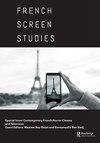Ethics of care in documentary filmmaking since 1968
IF 0.5
2区 艺术学
0 FILM, RADIO, TELEVISION
引用次数: 1
Abstract
The study of documentaries asks us to consider non-fiction films as sites for the articulation of ethical relations that develop between filmmakers, their subjects and viewers. Faced with the moments of crisis, vulnerability, instability and change often at the heart of documentary films, scholars have accounted for the mutually constructed social and political reality that filmmakers share with their subjects, as well as the impact of these filmed encounters on their communities. This special issue of French Screen Studies refocuses the ethical debates arising around documentary film on its relationships with a relatively new field of pragmatic philosophical and political inquiry known as the ethics of care. Presented here are articles on documentaries that address a variety of situations, ranging from the fight for women’s reproductive rights to the current refugee crisis, by scholars interested in examining the implication of documentary film in care projects as they have played out in French and Francophone documentary filmmaking since 1968. Documentary filmmakers and theorists have long grappled with the ethical, epistemological and aesthetic implications of their choices of how to record and show any given part of reality, while interrogating the imperative to provide ‘authentic’ representation. It bears asking to what extent documentary filmmakers comment upon the world – or build the world through their films. For instance, in The Subject of Documentary, Michael Renov suggests that ethical inquiry in this regard begins with the relationship of a given documentary film to dominant and emergent narratives, and then to the filmmakers’ responsibilities towards both their subjects and viewers (2004). He recognises how difficult it can be for ethical examinations to compete with a quest for knowledge, in what he has observed as ‘this pitting of ethics against epistemology’ (161). Ethical inquiry of this nature is therefore iterative, responding to changes in industrial practices and technology, and responding to the ever dynamic cultures of politics, journalism, law, medicine and health. Which strategies of engagement can motivate viewers to invest in the position taken by a given film, to learn about and from it – even trust it? Like labours of care, the work of documentary and its effects on viewers at times resists intelligibility and determinacy. It nevertheless always has the potential to change the conversation on a subject matter that calls for attention, while cultivating receptivity and a sense of responsibility and justice. The issues at the heart of the ethics of care can enrich this line of questioning by refocusing what is ethically at stake in the relationships between the filmmakers and their subjects as caregivers and recipients of care, as well as on viewers as witnesses to care, to the vulnerability of others and, ultimately, their own. Originally focused on the private and intimate spheres of life, the ethics of care has evolved into a philosophical inquiry, political theory and vision of advocacy aimed at a broader understanding of and public support for caregiving activities within a network of social relations. It assumes that there is both significance to the relationships between caregivers and care-receivers and general interest in all human relationships in a wide range of contexts, public or private. Specificity of context, relationality and vulnerability are fundamental to understanding the decisions that caregivers make in terms of the FRENCH SCREEN STUDIES 2022, VOL. 22, NO. 1, 1–5 https://doi.org/10.1080/26438941.2021.20035511968年以来纪录片制作中的关怀伦理
纪录片研究要求我们将非虚构电影视为表达电影制作人、拍摄对象和观众之间道德关系的场所。面对纪录片核心的危机、脆弱、不稳定和变化时刻,学者们解释了电影制作人与拍摄对象共同构建的社会和政治现实,以及这些拍摄的遭遇对他们社区的影响。这期《法国银幕研究》特刊将围绕纪录片展开的伦理辩论重新聚焦于纪录片与一个相对较新的务实哲学和政治研究领域——护理伦理——的关系。本文介绍了一些关于纪录片的文章,这些文章涉及各种情况,从争取妇女生殖权利到当前的难民危机,作者是有兴趣研究纪录片在护理项目中的意义的学者,自1968年以来,纪录片一直在法国和法语纪录片制作中上演。纪录片制作人和理论家长期以来一直在努力解决他们选择如何记录和展示现实的任何特定部分所带来的伦理、认识论和美学影响,同时质疑提供“真实”再现的必要性。值得一问的是,纪录片制作人在多大程度上评论世界——或者通过他们的电影构建世界。例如,迈克尔·雷诺夫在《纪录片的主题》一书中提出,这方面的伦理调查始于特定纪录片与主导叙事和新兴叙事的关系,然后是电影制作人对其主题和观众的责任(2004)。他认识到,在他所观察到的“伦理与认识论的对立”(161)中,伦理考试与求知竞争是多么困难。因此,这种性质的伦理调查是反复的,对工业实践和技术的变化做出回应,对政治、新闻、法律、医学和健康等不断变化的文化做出回应。哪些参与策略可以激励观众对某部电影的立场进行投资,了解并从中学习,甚至信任它?就像护理工作一样,纪录片的工作及其对观众的影响有时会抗拒清晰度和确定性。然而,它总是有可能改变关于一个需要关注的主题的对话,同时培养接受能力以及责任感和正义感。护理伦理的核心问题可以通过重新关注电影制作人和作为护理者和接受者的受试者之间的关系中的道德利害关系,以及作为护理见证人的观众,对他人的脆弱性,以及最终对自己的脆弱性的关注,丰富这一问题。护理伦理最初专注于私人和亲密的生活领域,现已演变成一种哲学探究、政治理论和倡导愿景,旨在更广泛地理解社会关系网络中的护理活动,并为其提供公众支持。它假设照顾者和被照顾者之间的关系既有意义,也有对公共或私人环境中所有人际关系的普遍兴趣。根据《2022年法国筛查研究》,第22卷,第1,1-5号,背景、关系和脆弱性的具体性是理解照顾者所做决定的基础https://doi.org/10.1080/26438941.2021.2003551
本文章由计算机程序翻译,如有差异,请以英文原文为准。
求助全文
约1分钟内获得全文
求助全文

 求助内容:
求助内容: 应助结果提醒方式:
应助结果提醒方式:


